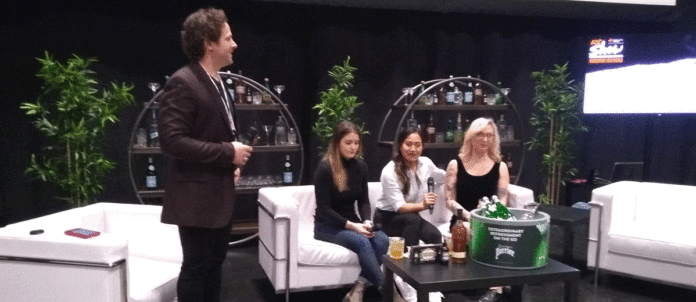TORONTO — This year’s RC Show in Toronto showcased Canadian bartenders working to up the experiences of patrons and taking the reins in pushing for more equitable workplaces and sustainable use of ingredients in their cocktails.
At the Working the Stick in 2018 presentation, three Canadian female bartenders spoke about their efforts to move the bartending profession in new directions and pushing for a more sustainable bartending culture.
Chantelle Gabino, a brand ambassador with Bittered Sling Bitters and general manager of Parts & Labour in Toronto, says bartending today is more than simply pouring and mixing drinks, “it is about hospitality, as at the end of the day we are here to engage with our guests and create experiences for them that are memorable. I think that one of the things that has happened over the last several years is that we have a more educated consumer.”
This more educated consumer is demanding more from bartenders in terms of the kinds of drinks they will need to produce and the kinds of experiences they wish to have. That often means not just creating interesting cocktails but pairing those creations with an emphasis on enhancing the experience of the patron who is sitting at the bar. As an example, Gabino cited creating a drink specifically to celebrate a birthday.
“[Bartending] is now being able to create an experience where the focus is just as much on the guest and what they need, as it is about the drink,” adds Gabino. “When they come into my bar I want to give them what they want, but also just a little bit more. That is the difference between good service and hospitality.”
Jess Mili, a bartender with Civil Liberties in Toronto agrees that today’s bar patrons are more sophisticated — their tastes are certainly making the best bartenders up their game and work to stay ahead of trends. At the same time, bartenders are also doing a lot behind the scenes by pushing for healthier work environments for staff and patrons alike.
Katie Ingram, head bartender at L’Abbatoir in Vancouver, says that there is a now a new emphasis by bartenders to work towards having better work-life balances, especially for young female bartenders who are looking to advance their career while maintaining a family or seeking to start a family.
“It is about planning your life accordingly, setting time aside for yourself and setting your goals to stay healthy,” Ingram adds.
All of the panelists were especially supportive of how bartenders and bar staff have also taken a leading role in tackling the issues brought forward in the wake of the #MeToo movement. All agreed that a cultural change is happening in bars among staff and management, and bartenders are now setting the example for not tolerating sexist and harassing behaviour.
Gabino points to the Dandelion Initiative in Ontario that is working to create safe working environments in the province’s workplaces, as well as one bar that recently instituted a program that allows female patrons who are being harassed or feel unsafe with a date to use a code word with the bartender and staff and management will be on hand to help them get out of the situation safely.
Ingram said another area where bartenders are leading the way is with issues around sustainability and reducing waste. She pointed to how many bartenders are moving away from using plastic straws and working to find ways to cut back on the wastage of ingredients in the creation of many cocktails.
“Bartending is a gratuitously wasteful industry — we throw a lot of things out and we need to rethink our ingredients and waste,” Gabino said to those attending her seminar Ethical and Sustainable Bartending in 2018.
Gabino says that she came to understand how important it is for bartenders to set an example by working towards reducing waste in their industry and for finding creative ways to use what would normally be thrown out when creating cocktails. At Parts & Labour, she started a ‘green incentive’ where she took a close look at the waste that was being produced and to find ways to drastically reduce that waste. At the same time, she used that initiative to engage with guests on the importance of not using plastic straws, create a rooftop garden where she grew the botanicals used in cocktails and later partnered with Jack Daniel’s Honey to establish an urban Apiary where she maintains a growing population of bees.
“Sustainability starts with proper training and if you are going to promote sustainability you need to incorporate it into you training and training manuals,” Gabino adds. “And you need to get creative and to use your bar and cocktails to showcase sustainability. The bar is our stage to communicate with people, so they know what you are doing.”


















